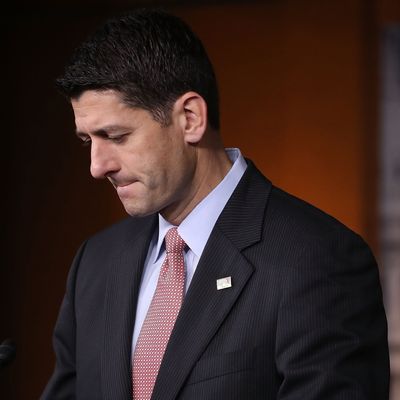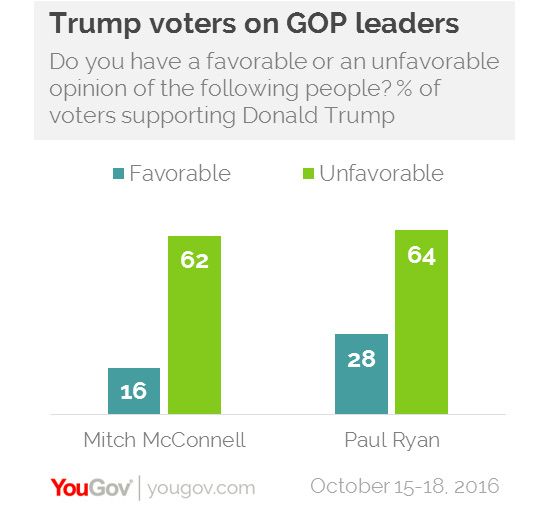
Last week, Paul Ryan announced that he would no longer defend Donald Trump — and gave the Republican caucus in the House permission to do the same.
Trump voiced his disappointment with the Speaker many times in the ensuing days, going so far as to accuse Ryan of supporting “opened borders, amnesty, and bad budgets.”
Those attacks may have done little to boost Trump’s standing in the presidential race, but they did quite a bit to diminish Ryan’s standing among GOP voters.
Perhaps the most eye-popping figure in YouGov’s new poll is this: The Republican Speaker of the House has a 61 percent unfavorable rating among Clinton voters — and a 64 percent unfavorable rating among Trump backers.
Senate Majority Leader Mitch McConnell fares no better.

The fact that Ryan’s numbers moved so dramatically in seven days suggests that these figures are malleable. And the Speaker could reasonably hope that his party’s base will take a dimmer view of its 2016 nominee after what looks to be a disappointing Election Day for red America. (People like nominees who weren’t defeated.)
Except: The whole point of Trump’s attack on Ryan was to pin blame for the mogul’s (likely) loss on a traitorous Republican Establishment. It seems entirely possible that Trump has both the megaphone and the credibility with a significant chunk of the GOP base to make that narrative stick, even after November.
If it does, the implications for governance in the United States could be disastrous. As Vox’s Matt Yglesias notes:
To sell a compromise to your base, it’s important to be trusted heading into the negotiation. That way when you walk out of the room with a deal and say, “look, guys, I know this isn’t everything we want, but it’s the best deal we could get,” you are credible and can convince people.
But when most of your constituents hate you at the start, then almost any compromise is bound to be seen as a sellout. That’s a recipe for more gridlock.
What’s more, the most likely outcome of this year’s House elections is a smaller, even more radical Republican majority. If Paul Ryan stays on as Speaker, his job will basically be to drive up his own unfavorable rating with the GOP base, by working with Democrats to keep the country running.
If Ryan decides that isn’t a job he’s interested in — or else, decides (yet again) to put his own political interest above principle, and joins his colleagues in government-shutdown gimmicks — Hillary Clinton’s presidency could get very nerve-wracking, very fast.






























